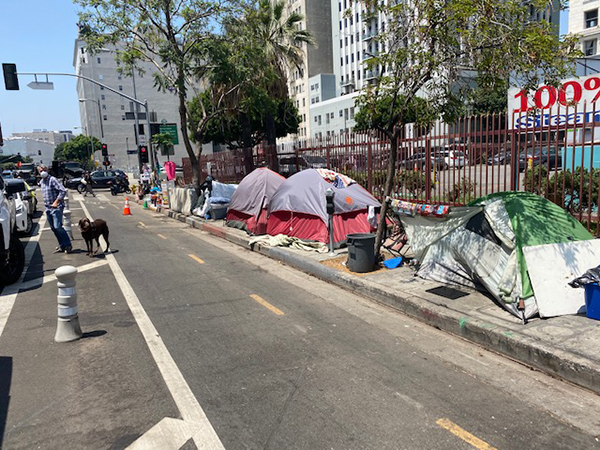Wave Wire Services
LOS ANGELES — Los Angeles County is seeking to be dismissed from a lawsuit brought by a coalition of downtown businesses and residents seeking to force the city and county to step up their response to the rising number of homeless encampments on local streets and near freeways.
The county contends in its motion, filed in Los Angeles federal court, that it already spends hundreds of millions of dollars each year on the homelessness crisis and has quickened its pace in recent years. While stating that it shares the goals of the complaint filed last year by the L.A. Alliance for Human Rights, the county argues that the lawsuit is not a proper forum to achieve a remedy to the problem.
The L.A. Alliance alleges 14 causes of action, nine against the county, to support what county lawyers describe as “a broad and unmanageable” federal court injunction.
U.S. District Judge David O. Carter, who is overseeing the case, set a hearing for May 10 to deal with the motion.
“There is simply no precedent under federal or state law to support such a remedy,” county attorneys wrote. “Complex policy questions about how to address homelessness must be resolved by the county’s elected governing body, the Board of Supervisors. This lawsuit seeks to intrude upon the county’s legislative process based on untenable legal theories.”
Daniel Conway, spokesman for the L.A. Alliance, said the county’s action was foreseeable and predicted the motion would fail to convince the judge to strike the county and leave the city of Los Angeles as the lone defendant.
“We weren’t surprised,” Conway said. “For a year, their lawyers have looked for every opportunity to convince us that [the homelessness problem] is the city’s fault. It’s a tactical move — they’re trying to throw sand in the gears.”
The county stated that it has 11 different departments — Children and Family Services, Health Services, Mental Health, Public Health, Public Social Services, Los Angeles Homeless Services Authority, Development Authority, Sheriff’s Department, Probation, Public Defender, and Workforce Development, and Aging and Community Services — working to help people experiencing homelessness.
In its argument for dismissal from the suit, the county contends the city is powerless to stop the spread of homeless encampments on its streets because Los Angeles has been “unable to fully enforce its anti-vagrancy laws.”
Previously, the L.A. Alliance filed a notice of intent with the court for a preliminary injunction, a first step toward placing the city and county into a court-supervised receivership.
The plaintiffs contend that “in the absence of a consensual agreement by the parties, court intervention becomes necessary. Once it is clear that the local governments are unable/unwilling to address the problem adequately, the courts must take a more active role.”
In its notice, the coalition wrote that despite settlement conferences and discussions, no agreement has been reached in the year-old lawsuit, and the county “appears intent on denying its role in causing this crisis in the first place.”
“The death rate for persons experiencing homelessness is now up to five-per-day and the crisis on the streets is more desperate than ever,” according to L.A. Alliance. “Immediate and sweeping action is needed, yet defendants drown in politicking and bureaucracy.”
Nine days after the lawsuit was filed in March 2020, the parties suspended litigation with the intent to explore settlement.
Any proposed solutions now appear bogged down in bureaucratic snarls between the city and county, prompting Carter to consider how the power of the court could be used to speed up efforts to get city sidewalks cleared and homeless people placed in housing.
While about 8,000 beds are reportedly already in place for the needy, bureaucratic tangles and neighborhood resistance to interim or supportive housing have continually blocked the path forward, according to the coalition.
Los Angeles City Councilman Mike Bonin has suggested that city officials are not “nimble or forceful enough” to adequately respond to the homelessness crisis, and called for a judicial consent decree under Carter’s supervision to compel immediate action.
If the parties agree, such a decree would end the lawsuit with a settlement giving Carter power to order the city and county to build shelters and provide services.











